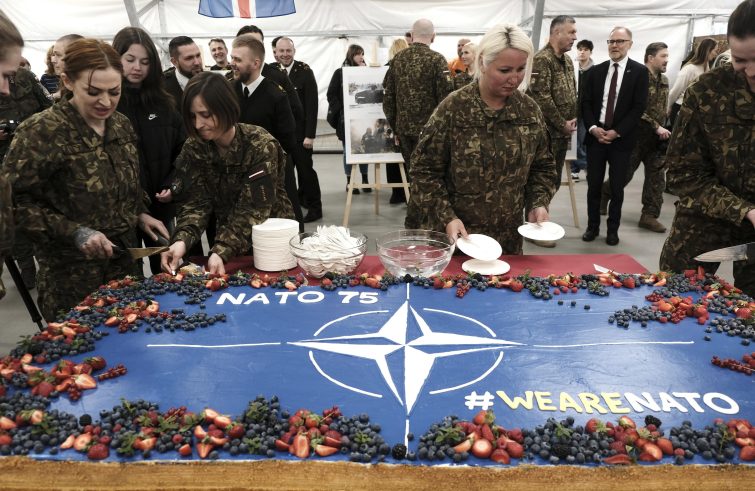
Over the past 75 years, NATO’s membership has almost tripled. Since its founding treaty was signed by 12 countries in 1949, 20 more have joined the North Atlantic intergovernmental military alliance. Today, NATO is a 32-nation alliance that has played a pivotal role over the past 75 years. “Without NATO, we would be trapped in a grey zone where war would be experienced in its fullest sense,” asserts Alessandro Politi, Director of the NATO Defence College Foundation (NDCF). Indeed, during the Cold War years, while NATO members were busy building up their conventional and nuclear arsenals, they were also busy avoiding the triggers of a global conflict.
Mr. Politi, how important is this anniversary?
75 years is an impressive anniversary. When Donald Trump said that NATO was useless, my Foundation reminded him that there had been two world wars before the Alliance. The very fact that there was no third war in Europe is a fundamental difference.
Without NATO, we would be trapped in a grey zone where war would be experienced in its fullest sense.
The organisation is “stronger today than ever before”, according to NATO Secretary General Jens Stoltenberg. Is this really the case?
In post-Cold War terms, NATO is stronger because the huge disparity between the former Soviet conventional forces and the Atlantic forces has been greatly reduced, with substantial nuclear parity. In that respect, NATO is stronger today. NATO’s military spending is higher than Russia’s, even though the latter faces a war economy: the Russian Federation has the equivalent of Spain’s GDP, while NATO combines that of the European Union with that of the United States.
Since then, the Alliance has grown.
This is certainly an indication of the attractiveness of NATO, but not necessarily of its strength. Some countries still have aspirations for membership. But enlargement requires greater efforts to secure borders and build political consensus.
What is the most important legacy of the past?
The power to prevent the causes of war, which is not an easy thing to do. A war of aggression is still a war of aggression, and while there is an obvious responsibility on the part of those who choose to resort to war, the first step is to defuse its dynamics. This is a great challenge, because sometimes it is necessary to ensure that there is broad cooperation, which often does not happen.
In particular, it is essential to value the recommendation made by the Committee of Wise Men in the Harmel Report of 1967, which focused on the synergy between dialogue and détente.
At that time, and driven by the reunification of Europe, dialogue was a vital element to prevent misunderstandings that could escalate into nuclear war. Today, for other reasons, dialogue remains essential to making Europe a safe place, even if it seems impossible.
What, on the other hand, should be removed from the legacy of the last 75 years?
The vertical proliferation of nuclear weapons, not to mention the horizontal proliferation in other countries, is something that no one wants to see revived.
The future of NATO: can it be an instrument of peace without flexing its muscles?
NATO has already acted as a peacekeeping mechanism, despite the complexities of its being a political-military alliance, and has ensured that no wars were fought on European soil for 75 years. Let us remember that Europe has lived in a context of endemic and sometimes pandemic warfare for thousands of years.
Could NATO`s “barking at Russia`s door”, as Pope Francis said, have played a role in the Russian invasion?
The idea of NATO as an instrument of peace is a challenge in the light of an evangelical provocation like that of Pope Bergoglio. In practical terms, it would be a NATO that is able to prevent war without the use of deterrence or the use of force, which is a challenge in terms of values.
The Pope is saying to stop grinding one’s teeth, but this challenge is no easy task. Although unthinkable today, there have been US presidents who contemplated abandoning the path of nuclear deterrence.
Ronald Reagan, hardly an idle irenicist, sought to rid the world of nuclear terror by proposing the Strategic Defense Initiative (SDI). In his National Security Strategy, Barack Obama was equally pragmatic, believing that complete nuclear disarmament was the ultimate goal; a very important precedent. Both agreed, albeit in different camps, that the nuclear threat was ultimately unsustainable.
Meanwhile, Russian Foreign Minister Sergei Lavrov said the Chinese peace plan to resolve the Ukraine conflict was both “reasonable” and “the most straightforward” so far.
While it is not a foregone conclusion that Kyiv will accept the Chinese plan, it is a preliminary gesture on the part of Russia in an attempt at diplomatic dialogue, all of which is subject to confirmation, especially with this counterpart. Admittedly, it is more practical to refer to third-party proposals, albeit not far removed from the Russian Federation, and try to avoid Kyiv rejecting these outright. It should be remembered that in 2023 Kyiv had cautiously taken the Chinese plan into consideration, but made it conditional on the total withdrawal of Russian troops. It is hardly a coincidence, however, that Vladimir Putin is increasingly signaling that he might be willing to negotiate, nor is it a coincidence that recent news on Ukrainian defence has been less than encouraging. Both sides have an interest in clarifying the ambiguities in the public discourse. And time is running out before November.










